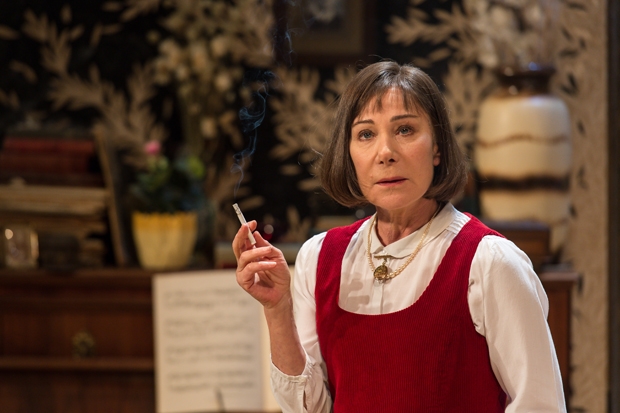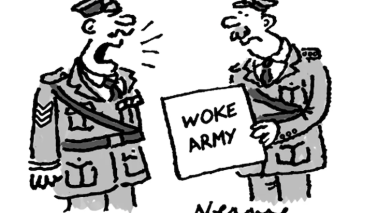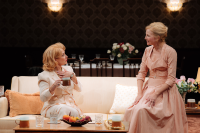Quite a hit factory these days, the Hampstead Theatre. The latest candidate for West End glory is Hugh Whitemore’s bio-drama about Stevie Smith. Not an obvious choice. The script, from the 1970s, recreates the atmosphere of Stevie’s life with effortless accuracy. Her vocabulary, her taste in clothes, her habits of thought and expression appear by magic as if drawn from the evidence of intimate friends. Yet Whitemore never met his subject. Zoë Wanamaker plays her as an adorable suburban eccentric, whose razor-sharp intellect peeps out from behind a façade of emerald pinafores and sherry decanters.
Stevie (Florence Margaret Smith) was born in Hull in 1902 and lived nearly all her life in Palmers Green. Aged eight she realised that death was a servant whom she could summon at will. This proved such a consolation to her childhood that she later insisted suicide should appear on the primary school syllabus. She worked as a secretary for an indulgent City gent who allowed her to write novels on office stationery in company time. She became a success in her thirties, fell out of favour, worked with Orwell at the BBC during the war, and made a comeback in 1957 with her best-known collection, Not Waving but Drowning.
The first half of this subtle and tender-hearted act of homage is a linear documentary. Stevie pootles about her Palmers Green home recalling her earliest literary inspirations and her reasonably busy love life. She unburdens herself of pert metaphysical observations about domesticity. Housework occupies those who have nothing better to do, she says, contentedly polishing a vase. Cooking, with all its slicing and bashing and pounding, is just sublimated violence. The play’s second half is more densely packed and dramatically satisfying. The high point is a beautifully detailed portrait of Stevie in the 1960s as a dreamy suburban starlet fawned over by a stable of male devotees (not the marrying type), who tolerated her brusqueness and her disordered lifestyle and who happily chauffeured her to poetry readings around the country in return for doses of maternal affection.
The play may be too languid and unspectacular for some (a few kids bailed out early), but the older spectators, especially the women, watched enthralled at this scatty and benign old dear. Simple reason: everyone’s mother is a bit like Stevie. Or becomes like her. Does the West End beckon? Hard to say. The target audience is a bit narrow, and Stevie is a neglected figure, whose meagre opus is a handful of cobweb-wreathed tomes. She hasn’t left a pot of gold or a legacy of scandal to stoke our interest, and she’s untroubled by envious relatives, spurned lovers, attention-hungry grandchildren or bitter ex-colleagues whose spats might keep her name in the papers. Best to see this now.
Anders Lustgarten’s new play Shrapnel examines a 2011 atrocity in which 34 unarmed Kurds were bombed by the Turkish army after being identified by an American drone. It also probes the politics and finance of the arms industry. Lustgarten crams several related stories into his 75-minute play and handles them in awkward snatches. The timeline leaps back and forth like a drunken acrobat. I’d put in at least an hour’s homework before leaving for the show because Lustgarten assumes a detailed knowledge of the grievances between the Turks and the Kurdistan Workers’ Party (PKK).
Overambition mars and fuddles his stagecraft. He wants to commemorate all the dead while highlighting the case of a middle-aged victim whose fortysomething wife had become pregnant after years of barren disappointment. The play does neither successfully. And he removes any emotional ambiguity by portraying the Kurds as poor but loveable scamps who indulge in a spot of picturesque smuggling to supplement their diet of goat’s cheese and pitta bread. What he overlooks is that the PKK were no slouches when it came to killing Turks.
And he uses the massacre as a pretext to squirt blame in all directions. He blames capitalism. He blames America. He blames popular TV demagogues. He blames the Turkish army’s culture of bullying. He blames British weapons designers who are seen lounging in their Home Counties labs discussing optics systems while also chatting about tomato cultivation in chalky soil (the heartless psychos!). He’s duped by the silly myth that arms dealers have the power to snap their fingers and commission a war as easily as booking a holiday. With more complexity and concision this play could have been a devastating polemic rather than a muddled bleat of protest. That’s the real tragedy here. If you put a massacre on stage, and muff it, you’re working for the slayers not the slain.








Comments